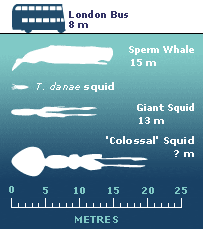BBC News/Science is reporting:
Monster warning to protect oceans
The landing of a colossal squid by New Zealand fishermen earlier this year offered a rare glimpse into the mysterious world deep beneath the waves. Scientist Mark Norman uses this week’s Green Room to argue that it also shows how marine life is being destroyed before it is understood.
It is only the fourth non-juvenile of this squid species ever examined by scientists, yet colossal squid are considered the most abundant Antarctic squid by weight.
 |
 I cannot see this as a highpoint of scientific discovery drawn from the distant reaches of our wild oceans I cannot see this as a highpoint of scientific discovery drawn from the distant reaches of our wild oceans 
|
 In the era of super science, nothing shows up how little we know of our own planet as finding massive “sea monsters”.
In the era of super science, nothing shows up how little we know of our own planet as finding massive “sea monsters”.
The largest single invertebrate animal ever found was recently captured by longline fishermen in Antarctic seas. Known as a colossal squid, it weighed 450kg (990lb), about twice the weight of the largest squid previously captured.
This event highlights two points; firstly, that our knowledge of the most common habitat on our planet – the deep sea – is still in its infancy, and secondly that such scientific discoveries indicate the scale and reach of global fisheries exploitation.
This squid is a very impressive animal. It has eyes larger than a blue whale’s, a sharp slicing beak as big as a rockmelon and a tongue covered in sharp teeth.
 |
SIZE COMPARISON
|
Its eight arms and two longer feeding tentacles are armed with toothed suckers and sharp hooks.
It swims with muscular fins and a big funnel for jet propulsion, and the undersides of its eyes have rows of lights like truck running lights.
You can find the full BBC post here.
___________________________
 This post was written by Richard Rodriguez, Rescue Tug Captain, and US Coast Guard approved instructor for License Training. You can read more of his articles at the BitterEnd of the net.
This post was written by Richard Rodriguez, Rescue Tug Captain, and US Coast Guard approved instructor for License Training. You can read more of his articles at the BitterEnd of the net.

 Join The Club
Join The Club





 This post was written by Richard Rodriguez, Rescue Tug Captain, and US Coast Guard approved instructor for License Training. You can read more of his articles at the
This post was written by Richard Rodriguez, Rescue Tug Captain, and US Coast Guard approved instructor for License Training. You can read more of his articles at the 




